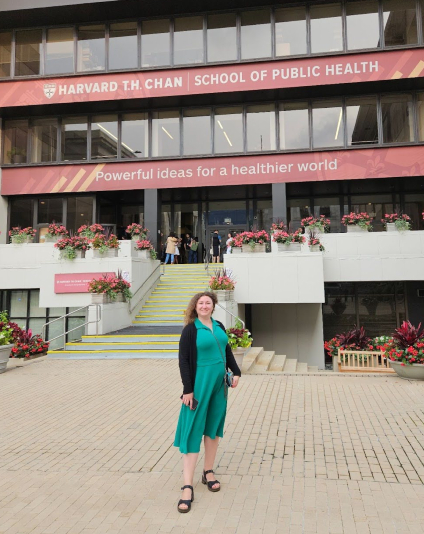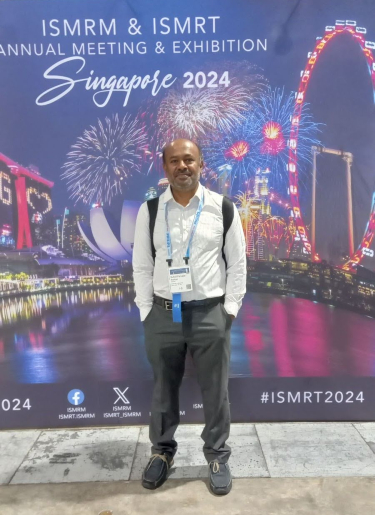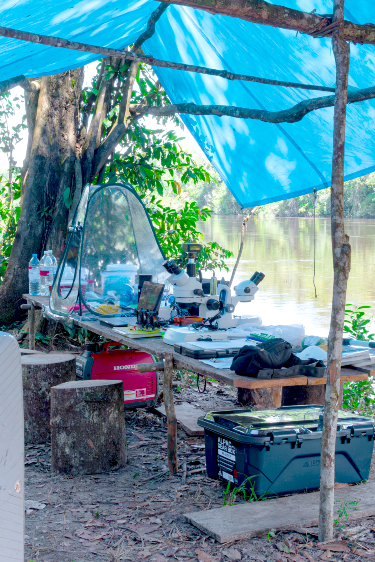Funding awards help CVM postdoctoral researchers advance their careers
The funds provide support for targeted needs at a crucial stage in researchers’ professional development.

The funds provide support for targeted needs at a crucial stage in researchers’ professional development.
Left to right: Valeriia Yustyniuk, Suhail Parvaze Pathan, and Marissa Milstein
Thanks to a generous donation from the estate of Dr. Ronald E. Engel, '54 DVM, and Mrs. Rhea Lindstrom-Engel, the University of Minnesota College of Veterinary Medicine (CVM) awarded $64,000 to support salary and professional development for postdoctoral researchers in 2024.
The annual gift goes to CVM postdocs conducting research in the area of veterinary medicine and is awarded based on financial need, personal character, and academic achievement.
This year’s funds were provided to 15 researchers, who used the awards for a range of activities such as publication costs, conference registration fees, travel for educational opportunities, and more.

Valeriia Yustyniuk, a postdoctoral associate at the Center for Animal Health and Food Safety, used the funds to attend two intensive summer courses: a Principal Investigator Crash Course at Columbia University Mailman School of Public Health, and Environmental Justice Boot Camp at Harvard T.H. Chan School of Public Health.
The Columbia University course focused on leadership—not just managing a lab, but understanding how to lead a team, handle conflicts, and think strategically about research directions, according to Yustyniuk. And the Harvard workshop provided a crash course in thinking critically about how to ask the right research questions and use epidemiologic methods to make a real impact, she says. What stood out to Yustyniuk the most was learning how social, political, and behavioral factors drive exposure and disease, which she says is key to finding solutions for environmental injustice.
"[The funds] allowed me to access specialized training that I otherwise wouldn’t have been able to afford, which is crucial as I’m still building my expertise and trying to carve out a niche in my field," Yustyniuk says. "The opportunity to attend these courses came at the perfect time, helping me gain new skills in environmental justice research and lab leadership. These experiences have not only broadened my knowledge but also boosted my confidence as I prepare to take on more responsibilities and independent projects in the future.”

Suhail Parvaze Pathan, a postdoctoral associate in CVM’s Comparative Magnetic Resonance Imaging (MRI) Research Lab, was awarded a Lindstrom-Engel Award to attend the annual meeting of the International Society for Magnetic Resonance in Medicine (ISMRM), held this year in Singapore.
One of the most important conferences in the field, Pathan had been trying to find a way to attend for several years.
“It was a dream come true for me,” he describes. “My interactions with pioneers in MRI research were enlightening and highly motivating.”
Pathan also had the opportunity to present his own research on Legg-Calvé-Perthes disease at the conference, allowing him to join an international conversation on cutting-edge developments in the field.

Marissa Milstein, currently a postdoctoral fellow at the College of Food, Agricultural, and Natural Resource Sciences, received a Lindstrom-Engel award during her time as a postdoc at CVM. Milstein runs a field research program in a remote area of Guyana in South America, where she works with the indigenous population studying the transmission of zoonotic diseases.
Because the area has no laboratory infrastructure, she has been working to build a mobile lab that she can bring to the community to support the work. She used the funds to purchase key pieces of equipment.
In her study of yellow fever, for example, she has been able to use the mobile lab to identify mosquitos that could be carriers.
“It’s so helpful to be able to do this on the ground, rather than having to collect samples and bring them back to the U of M for analysis, which could take months or years,” Milstein says. In addition, by performing these analyses on-site, they can collaborate more closely with the local community—a crucial component of the outreach her project works to accomplish.
Milstein believes that developing the mobile lab was a crucial step in her ability to secure larger grants to expand the work.
Dr. Engel, whose estate grants the funds, graduated from the University of Minnesota, where he also received both of his doctorates (veterinary medicine and radiation biology). He worked for the USDA beginning in 1977 and held the position of assistant deputy administrator for International Programs in the USDA’s Food and Safety Inspection Service until his retirement. Engel served as the department's international scientific liaison (a position he held beginning in 1988.) Over the years, he also served on an interagency radiation research committee under the White House Office of Science and Technology.
In addition, he wrote more than 60 scientific papers in fields such as radiation, toxicology, microbiology, and food hygiene. At the time of his death, he was president of the World Association of Veterinary Food Hygienists and had received numerous prestigious awards.
The awards honor his storied career by providing resources to the next generation of veterinary medicine researchers.
“These funds have a lifelong positive impact on the lives of these young scientists, and we take great pride and responsibility to carry on the vision of Dr. Engel and Mrs. Lindstrom-Engel in supporting them on their journey,” says Dr. Alonso Guedes, associate dean for research at CVM.